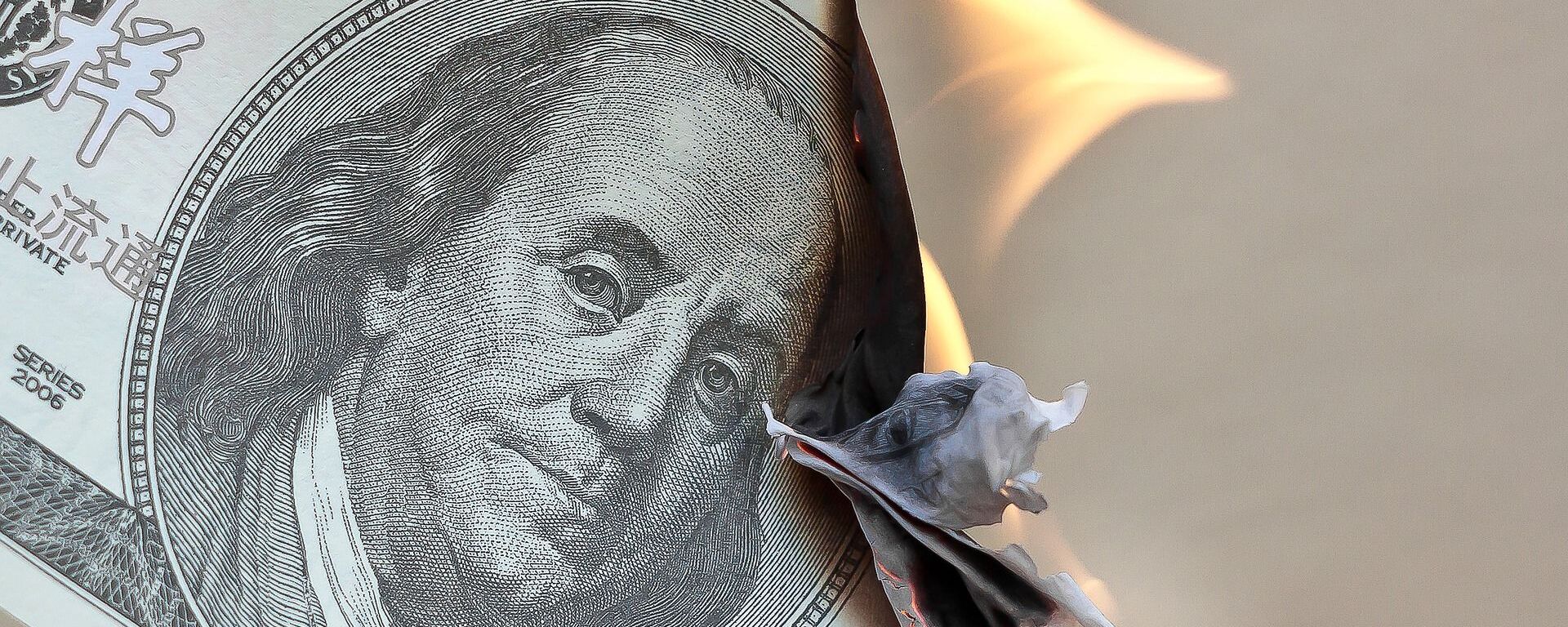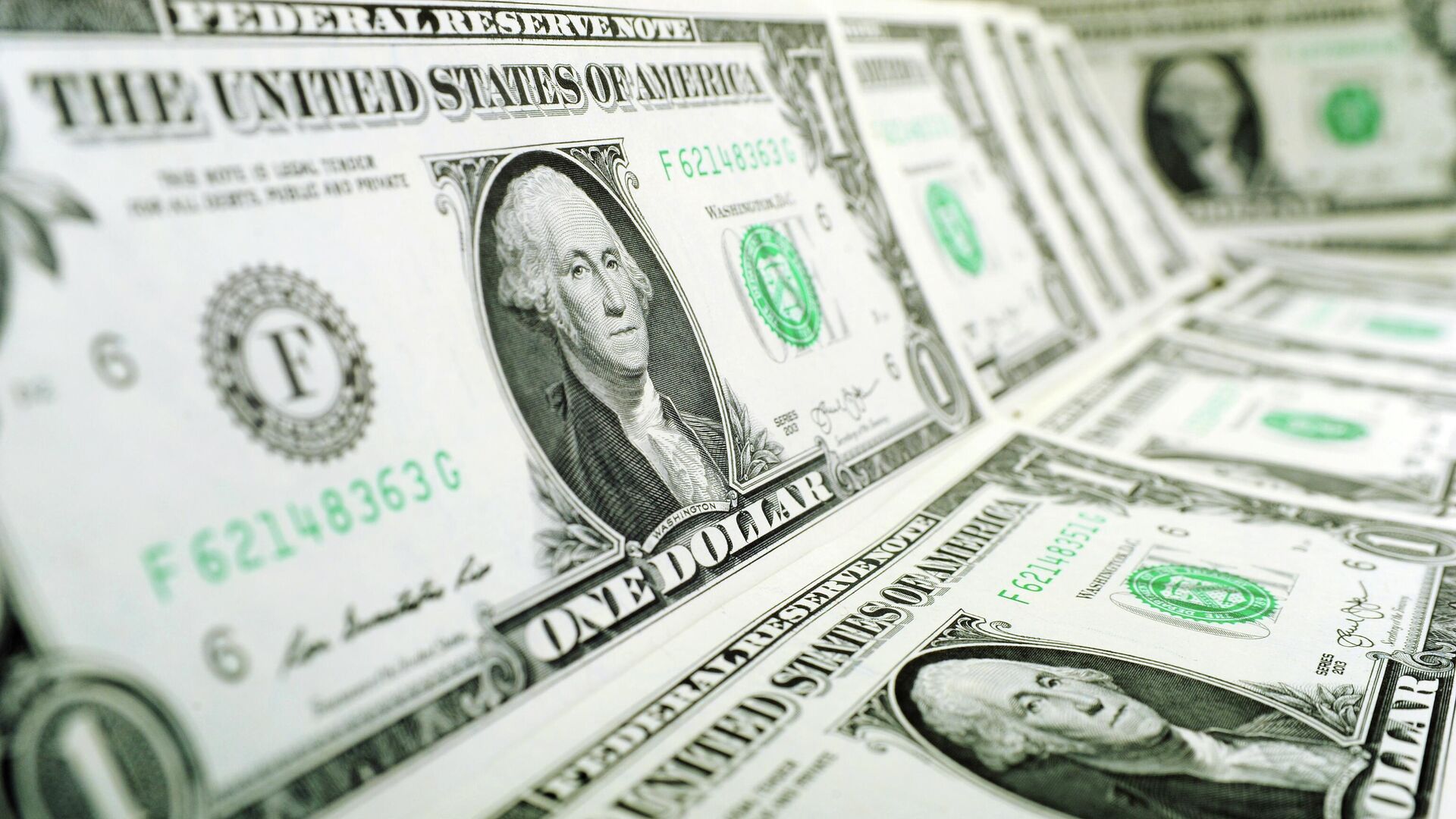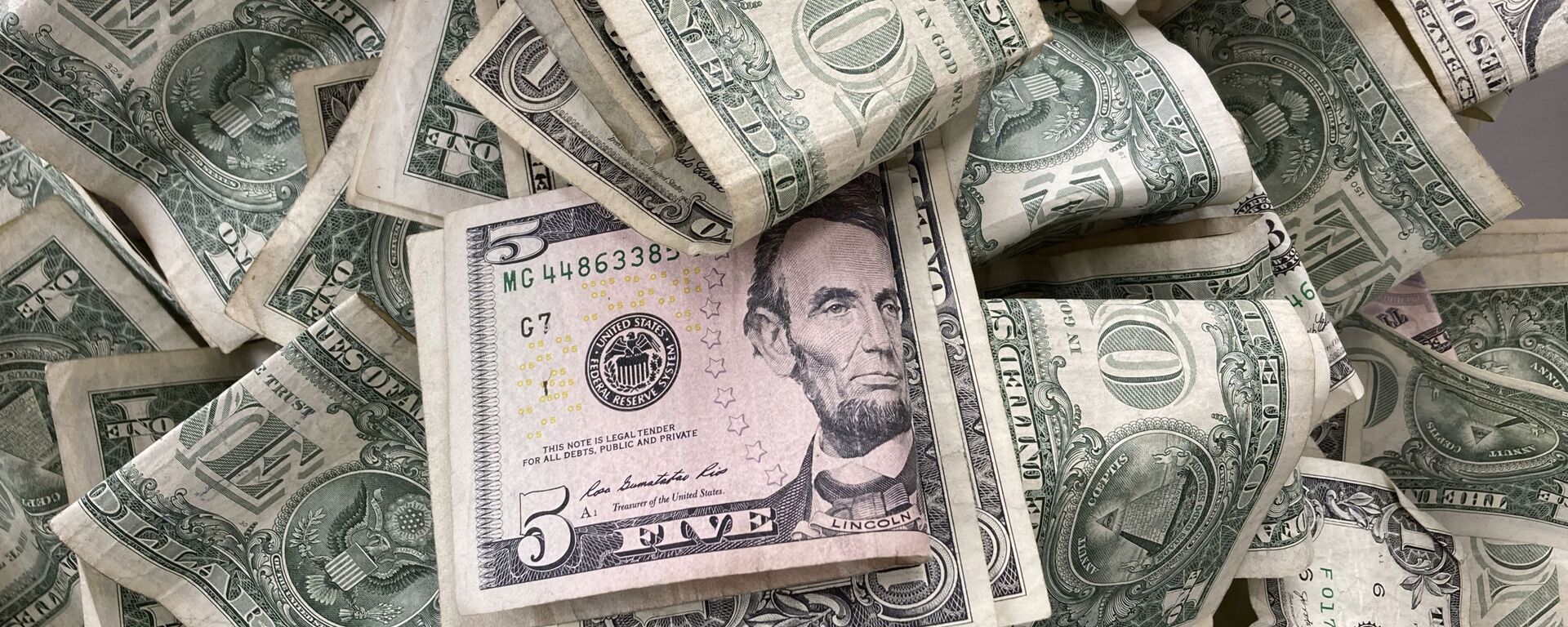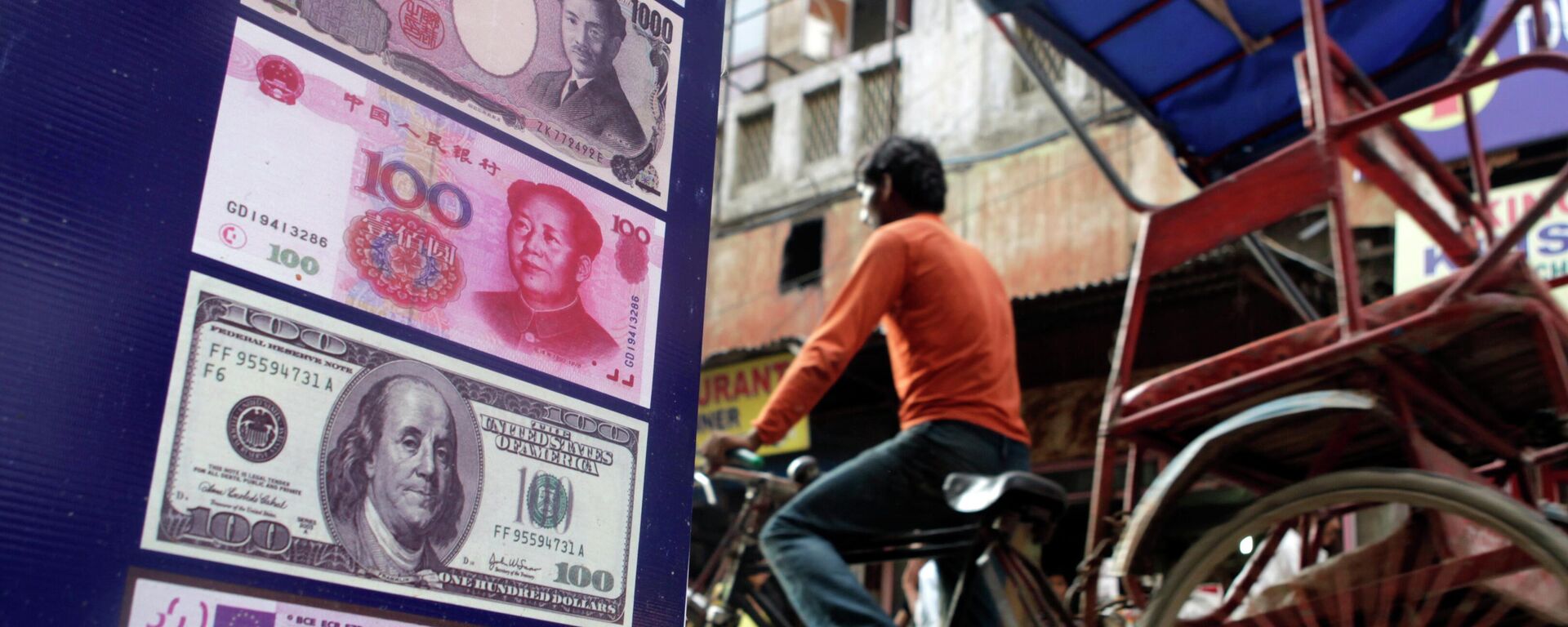https://sputnikglobe.com/20240425/us-scholars-uneasy-about-russia-and-china-dumping-dollar-1118113649.html
US Scholars Uneasy About Russia and China Dumping Dollar
US Scholars Uneasy About Russia and China Dumping Dollar
Sputnik International
DC scholars seem concerned about consistent Russo-Chinese de-dollarization efforts as more than 90% of mutual payments between the two are now being carried out in their respective currencies.
2024-04-25T17:56+0000
2024-04-25T17:56+0000
2024-04-25T17:56+0000
business
sergey lavrov
joe biden
russia
china
moscow
us
dollar
dedollarisation
world
https://cdn1.img.sputnikglobe.com/img/07e7/08/07/1112438893_0:0:3077:1731_1920x0_80_0_0_97ea585d71f67eca00648a9750c621c3.jpg
The Quincy Institute for Responsible Statecraft's Maya Krainc has drawn attention to Russian Foreign Minister Sergey Lavrov's notion that Russia and China have nearly completely stopped using the greenback in mutual trade.Russia and China are completing the de-dollarization of bilateral economic relations, with more than 90% of mutual payments made in national currencies, Lavrov emphasized on Monday during the 42nd meeting of the Council of Heads of Subjects of the Russian Federation.The minister pointed out that Russo-Chinese cooperation in energy, agriculture, industry and investment is steadily advancing despite the West's attempts to throw a wrench in the works.Moscow has repeatedly condemned Western countries for using the US dollar as a weapon and deliberately destroying established supply chains and trade ties via unilateral sanctions.She referred to the fact that Western sanctions have actually "helped" Moscow and Beijing to significantly enhance their mutual trade since 2022, which increased 26% to $240 billion in 2023.In addition to closing ranks with China, Russia has stepped up efforts to boost Eurasia's connectivity, continued the scholar, citing the nation's two new transport routes: the Russia-Caspian Sea-Turkmenistan-Uzbekistan-Kyrgyzstan corridor and the Belarus-Russia-Kazakhstan-Uzbekistan-Afghanistan-Pakistan corridor.The aforementioned Eurasian routes are part of Russia's broader project to link the countries of the Caspian Basin, the Persian Gulf, and Central, South and Southeast Asia via the international North-South Transport Corridor.By boosting Eurasia's infrastructural projects and improving connectivity Russia looks to ensure its economic development and access to rapidly growing Asian markets, thus compensating for the loss of its market share in the West. What's more, these new and deepened trade ties will most likely see a spike in local currency settlement, thus further fuelling de-dollarization.Last March, the Quincy Institute's scholars presumed that the de-dollarization trend seems to be "unstoppable", stressing that it has gained momentum since the Biden administration's decision to slap unprecedented sanctions on Russia and unplug it from the global financial system. Washington's move served as a wake-up call for many emerging economies that started to seek an alternative to the greenback.The passage of a hefty foreign aid bill allowing Team Biden to seize Russian state assets in the United States and use these funds for Kiev's benefit could amplify growing distrust in the US role as a guarantor of the global economy, Sen. Rand Paul warned in his op-ed for QI earlier this year. While just $5 billion out of $300 billion in frozen Russian assets are hosted by the US, the precedent spells danger for both states and individuals who store their money in the Land of the Free, international observers say.
https://sputnikglobe.com/20240105/one-in-three-un-countries-are-opting-for-de-dollarization-1115987761.html
https://sputnikglobe.com/20230528/dc-scholars-realize-de-dollarization-trend-unstoppable-1110755346.html
https://sputnikglobe.com/20240421/us-confiscation-of-russian-assets-will-supercharge-de-dollarization-1118035188.html
russia
china
moscow
Sputnik International
feedback@sputniknews.com
+74956456601
MIA „Rossiya Segodnya“
2024
News
en_EN
Sputnik International
feedback@sputniknews.com
+74956456601
MIA „Rossiya Segodnya“
Sputnik International
feedback@sputniknews.com
+74956456601
MIA „Rossiya Segodnya“
russia's de-dollarization effort, russia and china carrying out 90% of payments in local currencies, russo-chinese de-dollarization, de-dollarisation, russia and china are dumping us dollar, russia circumventing us sanctions, russia bolsters eurasia's connectivity, north-south transport corridor
russia's de-dollarization effort, russia and china carrying out 90% of payments in local currencies, russo-chinese de-dollarization, de-dollarisation, russia and china are dumping us dollar, russia circumventing us sanctions, russia bolsters eurasia's connectivity, north-south transport corridor
US Scholars Uneasy About Russia and China Dumping Dollar
DC scholars seem concerned about consistent Russo-Chinese de-dollarization efforts as more than 90% of mutual payments between the two are now being carried out in their respective currencies.
The Quincy Institute for Responsible Statecraft's Maya Krainc has drawn attention to Russian Foreign Minister
Sergey Lavrov's notion that Russia and China have nearly completely stopped using the greenback in mutual trade.
Russia and China are completing the de-dollarization of bilateral economic relations, with more than 90% of mutual payments made in national currencies, Lavrov emphasized on Monday during the 42nd meeting of the Council of Heads of Subjects of the Russian Federation.
The minister pointed out that Russo-Chinese cooperation in energy, agriculture, industry and investment is steadily advancing despite the West's attempts to throw a wrench in the works.
Moscow has repeatedly condemned Western countries for using the US dollar as a weapon and deliberately destroying established supply chains and trade ties via unilateral sanctions.
"Aside from reducing dependency on the Western-dominated global currency, these de-dollarization efforts allow Russia and China to avoid the myriad sanctions now preventing Moscow from doing business on the international market," wrote Krainc.

5 January 2024, 12:11 GMT
She referred to the fact that Western sanctions have actually "helped" Moscow and Beijing to significantly enhance their mutual trade since 2022, which increased 26% to $240 billion in 2023.
In addition to closing ranks with China, Russia has stepped up efforts to boost Eurasia's connectivity, continued the scholar, citing the nation's two new transport routes: the Russia-Caspian Sea-Turkmenistan-Uzbekistan-Kyrgyzstan corridor and the Belarus-Russia-Kazakhstan-Uzbekistan-Afghanistan-Pakistan corridor.
The aforementioned Eurasian routes are part of Russia's broader project to link the countries of the Caspian Basin, the Persian Gulf, and Central, South and Southeast Asia via the international North-South Transport Corridor.
"The newly announced routes would similarly allow Russia to bypass sanctions and access Asian markets," Krainc noted.
By boosting Eurasia's infrastructural projects and improving connectivity Russia looks to ensure its economic development and access to rapidly growing Asian markets, thus compensating for the loss of its market share in the West. What's more, these new and deepened trade ties will most likely see a spike in local currency settlement, thus further fuelling de-dollarization.
Last March, the Quincy Institute's scholars presumed that
the de-dollarization trend seems to be "unstoppable", stressing that it has gained momentum since the Biden administration's decision to slap unprecedented sanctions on Russia and unplug it from the global financial system. Washington's move served as a wake-up call for many emerging economies that started to seek an alternative to the greenback.
The passage of a hefty foreign aid bill allowing Team Biden to seize Russian state assets in the United States and use these funds for Kiev's benefit could
amplify growing distrust in the US role as a guarantor of the global economy, Sen. Rand Paul warned in his op-ed for QI earlier this year. While just $5 billion out of $300 billion in frozen Russian assets are hosted by the US, the precedent spells danger for both states and individuals who store their money in the Land of the Free, international observers say.





